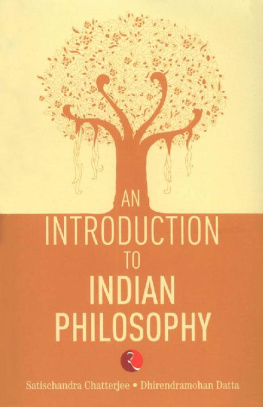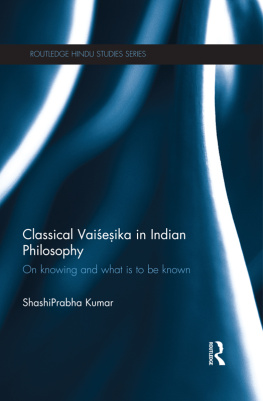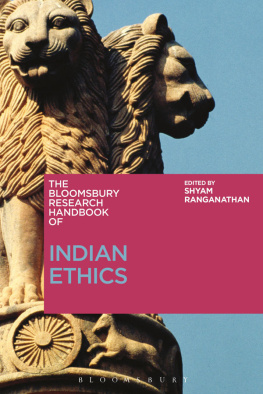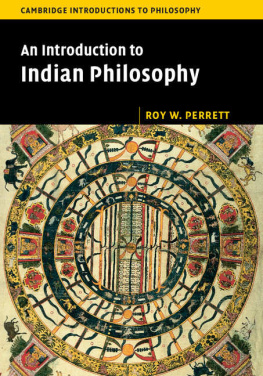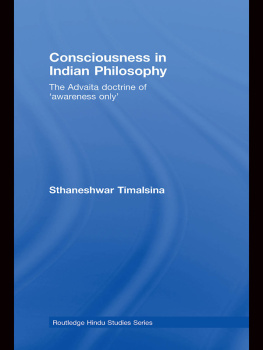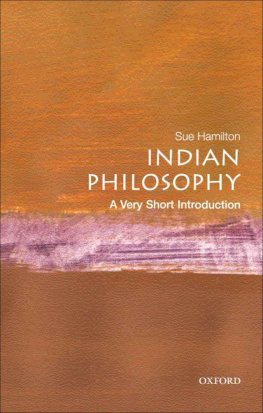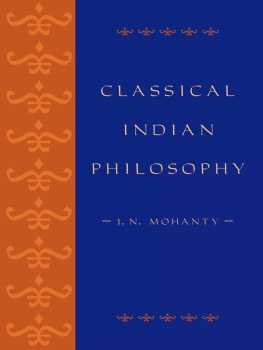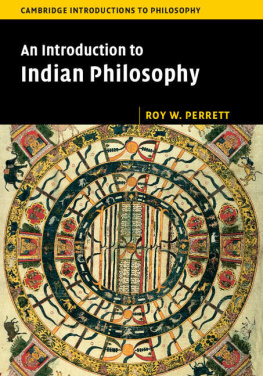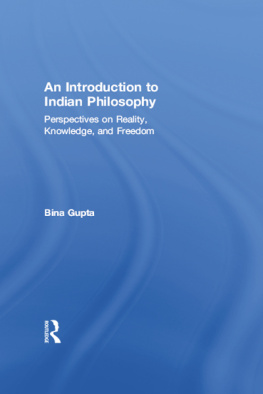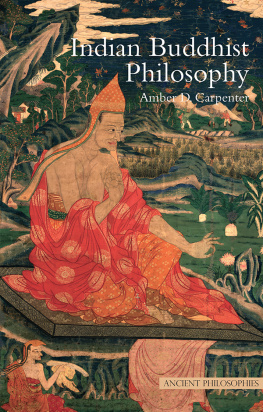AN INTRODUCTION TO INDIAN PHILOSOPHY
Satischandra Chatterjee (PhD) was formerly Head of the Department of Philosophy, Calcutta University.
Dhirendramohan Datta (PhD) was formerly Professor of Philosophy, Patna College, Patna University.
AN INTRODUCTION TO INDIAN PHILOSOPHY
SATISCHANDRA CHATTERJEE
And
DHIRENDRAMOHAN DATTA

Published by
Rupa Publications India Pvt. Ltd 2007
7/16, Ansari Road, Daryaganj
New Delhi 110002
Edition copyright Rupa Publications India Pvt. Ltd 2007
All rights reserved.
No part of this publication may be reproduced, transmitted, or stored in a retrieval system, in any form or by any means, electronic, mechanical, photocopying, recording or otherwise, without the prior permission of the publisher.
ISBN: 978-81-291-1195-1
Eleventh impression 2014
14 13 12 11
This book is sold subject to the condition that it shall not, by way of trade or otherwise, be lent, resold, hired out, or otherwise circulated, without the publisher's prior consent, in any form of binding or cover other than that in which it is published.
To
PROFESSOR S. RADHAKRISHNAN
And
THE LATE PROFESSOR K.C. BHATTACHARYA
Whose Teachings have Inspired the Authors
Contents
PREFACE TO THE FIRST EDITION
The object of this book is to provide a simple introduction to the Indian systems of philosophy. Each one of these systems has had a vast and varied development and cannot be treated adequately in a brief work like this. An attempt has been made to introduce the reader to the spirit and outlook of Indian philosophy and help him to grasp thoroughly the central ideas rather than acquaint him with minute details. Modern students of Philosophy experience great difficulty in understanding Indian problems and theories. Their long experience with university students has helped the authors to realise this and they have tried to remove them as far as possible. This accounts for most of the critical discussions which could otherwise have been dispensed with.
The book has been primarily written for beginners. The first chapter which contains the general principles and basic features of Indian philosophy, as well as a brief sketch of each system, gives the student a bird's-eye view of the entire field and prepares him for a more intensive study of the systems which are contained in the following chapters. It is hoped, therefore, that the book will meet the needs of the university students at different stages, as well as of general readers interested in Indian philosophy. It will serve the needs of B.A. Pass students who may be required to have a brief general acquaintance with Indian philosophy as a whole, as well as those of Honours students who may be expected to have a more detailed knowledge of one or more systems.
It is the firm conviction of the writers that Reality is many-sided and Truth is manifold; that each system approaches Reality from one point of view or level of experience, and embodies one aspect of Truth. They have tried to approach each system with sympathy and justify it, rather than dismiss it with a customary criticism. They believe that a sympathetic insight into the great systems will enable the student to grasp their truths more easily and give him a sound philosophical outlook.
While an attempt has been made to bring out the significance of Indian views in terms of modern Western thought, care has always been exercised to preserve their distinctive marks, such as their spiritual and practical outlook, their recognition of the different levels of experience.
The authors are grateful to Dr. Syamaprasad Mookerjee, M.A., D.Litt., B.L., M.L.A., Vidyvcaspati, Barrister-at-Law, ex-Vice-Chancellor, Calcutta University, at whose suggestion the work was undertaken, and to Sir S. Radhakrishnan, Kt., M.A., D.Litt., George V Professor of Philosophy, Calcutta University, Spalding Professor of Eastern Religions and Ethics, Oxford University, who has very kindly gone through the manuscript and made valuable suggestions. They are also indebted to Professor Krishnachandra Bhattacharyya, M.A., with whom they discussed some of the problems treated here and received much light and guidance. They are grateful also to the authorities of the Calcutta University, and especially to the Registrar, the Superintendent of the Press and his energetic colleagues, for the publication of the work.
PREFACE TO THE SECOND EDITION
The authors feel encouraged by the demand for a second edition of this book within such a short time. They are grateful to the many universities which have adopted this compendium as a textbook, and to the many lay readers who have intimated their appreciation of the book as a suitable introduction to Indian Philosophy. But at the same time the authors realise once more the great difficulty of compressing into such a volume all that is important in the arguments and theories of schools Which have evolved through nearly two thousand years, and developed intricacies which defy easy exposition. They are, therefore, painfully aware of the many shortcomings of the book, and very eagerly avail themselves of this opportunity of a second edition to remove defects, as far as possible, by addition, alteration, omission and rearrangement of topics. In this work of improvement they have received great help from teachers and scholars who have favoured them with detailed opinions and suggestion. The authors are thankful to all of them; but they are especially indebted, in this respect, to Professors Khangendranath Mitra, Haridas Bhattacharyya, Jadunath Sinha, Surendranath Goswami, Kalidas Bhattacharyya and Mr. Anilkumar Ray Chaudhury. If some of the suggestions could not be carried out, it was mainly because of the limitation of the original scope of the book, the necessity for economising paper, and the desire for avoiding difficulties that might embarrass the beginner.
The chapter on the Vednta has been partly rewritten. akara and Rmnuja have been dealt with successively (and not side by side, as before). The rationale of argumentative side of the Vednta has been substantially reinforced by the addition of many new paragraphs in small print. The authors hope that this will be useful to the advanced reader, while the simplicity of the original treatment, and the interest of the beginner, will remain unaffected.
It is necessary to mention that instead of following the ordinary translation practice of rendering 'vara' into 'God' and 'Brahman' into 'Absolute', the authors have used the word 'God' also for 'Brahman'. Just as 'Brahman' (without adjectives) is used, even by the Upaniads and ankara, for both the immanent, personal aspect, and also for the transcendent, impersonal aspect, similarly 'God' also has been used in English in this wide sense, and, therefore, sometimes for the Absolute (e.g. of Hegel), the Indeterminate Substance (e.g. of Spinoza), the Primordial Principle (e.g. of Whitehead). The exact sense in which 'God' has been used in this book will be clear from the context. Confinement of 'God' only to the Deity of Religion, and of 'Absolute' to the ultimate philosophical principle, while convenient in one respect, suffers from the disadvantage of suggesting as though they stand for two distinct realities, and not for two aspects of the same reality, as is the case in the Vednta.
PREFACE TO THE SIXTH EDITION
The authors feel highly gratified that the book is now being widely used in India, America, Great Britain and other countries, and that another edition has been called for so soon. This gives an opportunity for further revision and improvement. The authors are grateful to Professor Charles A. Moore of the University of Hawaii and all other teachers of Philosophy who favoured them with their opinions and suggestions for some improvements in the previous editions. They also express their thanks to Sri S. Kanjilal, Superintendent of the Calcutta University Press, and his colleagues for their help in bringing out this edition in time.
Next page
